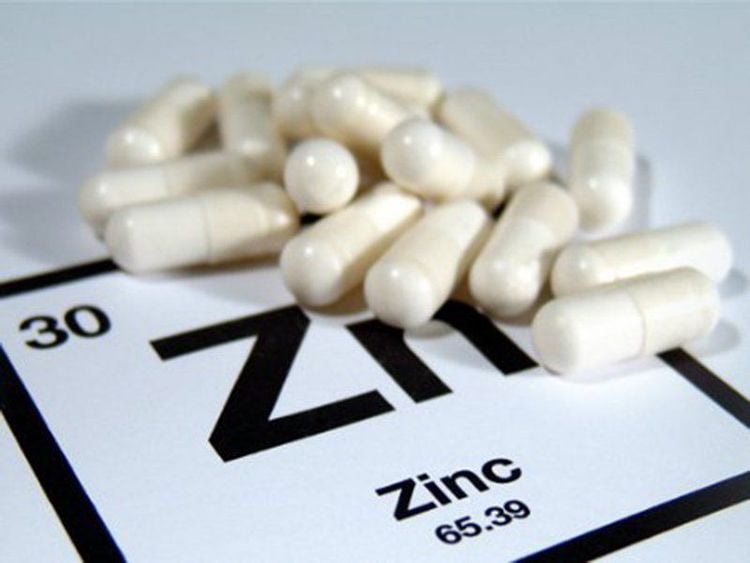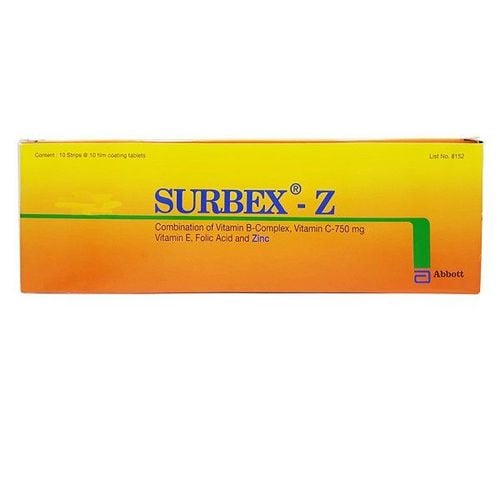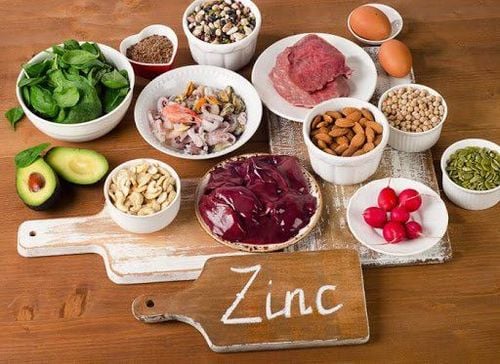This is an automatically translated article.
Zinc is a mineral that plays a very important role in the growth of children's height and physical health. Moreover, zinc also plays a role in maintaining the activity of the immune system to help children stay healthy and fight pathogens. To help children develop in the best way, you need to supplement the daily amount of zinc necessary for children.
1. The role of zinc in the child's immune system
Zinc plays a role in the development and maintenance of the immune system, is necessary for the protection of the body from pathogens, and helps in wound healing.Zinc deficiency impairs the development and function of most immune cells, including T lymphocytes, B lymphocytes, and macrophages. Studies performed in mice have shown that zinc deficiency causes hypoplasia of the spleen and thymus gland and reduces the production of immunoglobulins including IgA, IgM and even IgG.
In children with zinc deficiency, scientists also found a decrease in macrophage activation and a decrease in phagocytosis. Therefore, it is shown that zinc deficiency impairs immune function, increasing the risk of bacterial infections. Thereby reducing the growth and development of children, increasing the risk of malnutrition and death in children. In addition, zinc is also a component of more than 300 enzymes of the body. Zinc is an indispensable catalyst of RNA - polymerase, it plays an important role in DNA replication and protein synthesis. Therefore, zinc plays an important role in the process of cell division, promoting growth.
Therefore, when zinc deficiency, cell division will be difficult, seriously affecting growth, leading to stunting malnutrition. Many studies have shown that zinc plays a role in promoting growth through IGF-I.
Another effect of zinc is to help maintain and protect taste and smell cells. When zinc deficiency, the metabolism of taste cells will be affected, thereby leading to anorexia due to taste disorders. Children with anorexia will be malnourished, and at the same time affect growth and development.

Kẽm tốt cho hệ miễn dịch, hỗ trợ tối đa cho sự phát triển chiều cao và thể chất của trẻ
2. Signs that a child has a zinc deficiency
In recent years, zinc deficiency in children is a public health concern in many countries, especially developing countries. About 30% of the world's population is zinc deficient, of which a large proportion are children under the age of 5 in developing countries.
In Vietnam, the prevalence of zinc deficiency in children in the community is assessed based on low serum zinc concentration (<10.7 μmol/L) about 25 - 40% depending on the location and age group studied.
Many studies on malnourished children and prolonged diarrhea admitted to hospital in Hanoi and Ho Chi Minh show that the rate of serum zinc deficiency in children is still very high, about 50% - 90% depending on the extent and duration of the child's malnutrition and diarrhea.
According to the survey results on micronutrient deficiency in 2010 conducted on 586 children from 6 months to 75 months in Vietnam, the zinc deficiency rate was 51.9%. Children aged 6-17 months have the highest risk of zinc deficiency compared with other age groups.
Common manifestations of children with zinc deficiency are loss of appetite, abnormal taste, hair loss, children with prolonged diarrhea, skin and eye lesions, growth retardation, delayed sexual organ maturation and growth retardation. impotent.
Zinc deficiency also causes many effects on children's health and development such as anorexia, taste disturbance, growth retardation, rickets, malnutrition, unexplained vomiting; children with sleep disorders such as trouble sleeping, restless sleep, waking up many times during the night, night crying, insomnia, slow thinking, poor memory; children with diarrhea, respiratory infections; children with poor eyesight, children with inflammatory skin diseases, eczema, slow-healing wounds.
Zinc deficiency not only affects the body but it also has a bad impact on the mind, making children irritable. Because zinc helps transport calcium to the brain and calcium is one of the important substances that help stabilize nerves.
Most cases of zinc deficiency in children occur when the amount of zinc is not consumed or absorbed, the amount of zinc lost from the body increases due to acute diarrhea and vomiting; or due to increased body need for zinc as in pregnant women.
In addition, when the child's body is deficient in zinc, the meal will no longer be attractive to the child because this is a mineral that enhances taste.

Kẽm tăng sức đề kháng giúp trẻ khỏe mạnh và chống lại các tác nhân gây bệnh
3. Zinc supplements increase children's resistance
The need for zinc in children under 1 year of age is about 5 mg / day, in children 1-10 years old about 10 mg / day, for adolescents and adults the need for zinc is about 15 mg / day for men. gender and 12mg/day for women.
For babies under 6 months of age, the best and most easily absorbed source of zinc is breast milk. However, the zinc content in breast milk will gradually decrease over time, specifically in the first 3 months the amount of zinc in breast milk is about 2-3mg/liter, in the next 3 months, the amount of zinc in breast milk will decrease to about 0.9 mg/liter. To maintain the zinc content in breast milk as well as provide zinc for the baby's development, you need to eat a lot of foods rich in zinc such as: oysters, oysters, shrimp, eel, pig liver, milk, beef. ..
For children over 6 months old, zinc supplementation can be through food, such as: In 50g of pork loin contains about 2mg of zinc, in 250g of yogurt there is 1.6mg of zinc, and half a chicken breast. has 1mg of zinc...
In addition, in order for children to be able to absorb zinc best, you should also supplement vitamin C for children from fresh fruits rich in this vitamin such as oranges, lemons, tangerines, grapefruits...
In addition, you can choose zinc supplements in the form of syrup, nuggets, or multi-micronutrient nuggets/syrups that contain zinc... especially when children have diarrhea, or respiratory infections, because the sick children will need a higher amount of zinc than usual.
In addition to zinc, parents also need to supplement their children with other important vitamins and minerals such as lysine, chromium, B vitamins,... errands.
Please regularly visit Vinmec.com website and update useful information to take care of your baby and family.













